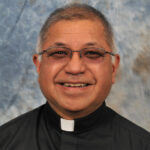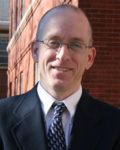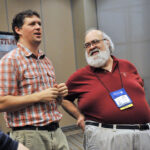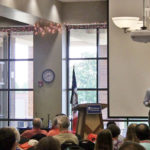
Lomax R. Campbell, director of the Office of Community Wealth Building of Rochester, N.Y., speaks during a Community Wealth Building Forum held Aug. 31-Sept. 1 in Davenport. Bishop Thomas Zinkula was among the participants. The forum explored the financial and social investment necessary to resolve the inequity and inequality that people of color face in Davenport.
By Barb Arland-Fye
The Catholic Messenger
Creating an inclusive economy in which all people have an opportunity and the resources to participate inspired a two-day Community Wealth Building Forum that drew leaders from the faith and secular communities, including the Diocese of Davenport.
The leaders, including Bishop Thomas Zinkula and Father Rudolph Juarez, pastor of St. Anthony Parish in Davenport, attended the forum that explored the financial and social investment necessary to resolve the inequity and inequality that people of color face in Davenport. For instance, “Before the pandemic, 29% of Davenport’s Black households owned their homes compared to 67% of Davenport’s white households. Nationally, the Black homeownership rate is 41%,” the Equity Coalition of Davenport reported.
Community violence, lack of affordable housing and jobs that provide a living wage were the catalysts for the forum, but the focus was on building community wealth, not to dwell on deficits. “We’re all one big human family all trying to figure it out,” said Lomax R. Campbell, director of the Office of Community Wealth Building of Rochester, New York, the forum’s main presenter. Kent Johnson, market manager for Consumer Credit Counseling Service of Northeastern Iowa, spoke on the topic of Financial Empowerment Centers. The forum took place Aug. 31-Sept. 1 in Davenport.
Challenges to building community wealth include persistent multi-sector cultural gaps, globalization effects, growing skills gaps, the “Silver Tsunami” (Baby boomers aging out of the workforce) and racial and social bias, Campbell said. These problems have implications for many systems — from government to business to human services to food and housing. A possible solution, Campbell said, is Community Wealth Building, a systemic, evidence-based approach. He explained how this approach has benefited the citizens of Rochester, New York.
Community Wealth Building takes a comprehensive approach to social and economic problems, is inclusive and collaborative in building assets, employs a community-based “bottoms up” economic development strategy and occurs at all levels of society, Campbell said.
John DeTaeye, a lead organizer of the forum, sees Community Wealth Building as offering on-the ground solutions to localities and regions to produce more sustainable, lasting and equitable economic outcomes. “Equity and equality are fundamental to the development of our community. We have to start thinking about who’s not involved in the economy now and why.” Systemic change is essential, or the community will continue to pay to incarcerate people rather than fostering their ability to be contributing members of the community, he said.
Campbell explained what Community Wealth Building looks like in practice. For families, it could include individual development accounts, home and property ownership, small business development, lending and investment circles and earned income tax credit benefits. At the community level, it could include for-profit and nonprofit community development corporations, community development financial institutions, social enterprises, land trusts, employee-owned stock plans, and cooperatives. At the municipal/regional level, it could include services and programs, policy change, municipal-owned enterprises, venture fund creation, and pension fund investments in private equity firms. In Davenport, forum supporters envision creation of an Office of Community Wealth Building.
“What has impressed me most about the preparatory work to establish a Davenport Office of Community Wealth Building is that these are efforts rooted in the community itself,” Father Juarez said. “Through the investment and buy-in of representatives from business, education, religion, government and community organizations, we are working to create a more stable, inclusive, safer and economically stronger community.” This will be accomplished “by means of educating and forming the economically and socially disenfranchised on such things as employment opportunities, loan applications, home ownership, as well as teaching financial independence skills and wealth building.”

Father Juarez sees it as “a noble venture, and certainly in accord with how St. Anthony Parish has incorporated the Two Feet of Social Action, which incorporates charity and justice. (We are) feeding and clothing the needy in charity at our McAnthony Window, and empowering the marginalized to become self-sustaining by supporting the efforts to establish the Office of Community Wealth Building, which is the work of justice.”
In his opinion, the next step is to “marshal community support for this good work because it is one thing we can do as a community to help create a more stable and positive environment for everyone. We don’t need any more pockets of despair and hopelessness. What we need is for those who feel left out of the benefits of our society to see that they have a part to play in their future. If we work to create the Office of Community Wealth Building, we are working for the common good. All of us win because we are helping to give those who most need it a sense of hope and faith in the future — and all of us can buy into that wonderful notion!”

The Diocese of Davenport was among the forum’s sponsors because it focused on a “broader community issue and the church has a responsibility to be at the table,” said Kent Ferris, the diocese’s Social Action Office director. He is grateful for the work of St. Anthony Parish and Father Juarez for modeling the Two Feet of Social Action, which included engaging in the forum.
DeTaeye appreciated the participation of more than 60 current and emerging leaders who “shared ideas, hopes and commitments to leveling the playing field and working collaboratively and cooperatively towards a more equitable Davenport.” The next steps, he said, are to identify a mutually agreed upon community wealth building/equity proposal and the strategy to get there.











